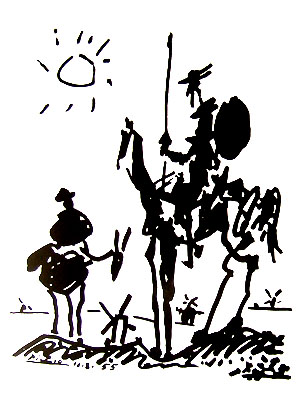Secondary Drives
There is an allegation that arises from time to time against the Reich and Lowen tradition, that it does or can create social mayhem. That is, it is feared that an individual will become too unrestrained and behaves, selfishly, predaciously, anti-socially, and everybody is the worse off.
This is really the doctrine of original sin. If in fact fundamental human nature is savage and bad, and civilization is the only restraining force, then freedom could be bad. However, a basic belief in this tradition is that human nature is good, and that bad behavior is a secondary drive. Secondary drives are arise from the natural drives that are distorted by muscular holding and the concomitant psychopathology.
A distinction needs to be made between the lessening of repression and disinhibition. Repression occurs in the muscular or middle layer, and is unconscious. Inhibition occurs at the surface or social layer (mainly the cerebral cortex) Alcohol is famous for disinhibition because in moderate or large amounts, it defeats the working of the cerebral cortex. In small amounts, alcohol may relax the muscular tension slightly and facilitate pleasure, but where there is significant repression, the temptation is always to drink more to get more free, to no real avail. Muscular repression and secondary drives are just exposed more.
Because repression in the muscular layer often gives rise to secondary drives, conscious inhibition may seem the crux of civilized behavior. From time to time social movements or 'inspirational' therapies arise which are based on the quick fix of disinhibition. They self-destruct. But natural, 'unarmored' behavior is pro-social and gracious. Natural behavior and disinhibited behavior should be readily distinguishable from each other by the lack of contact and real satisfaction in the latter.
Self-possession on the conscious level, and self-regulation on the body and emotional level, are a containment that relies neither on repression or inhibition.
It takes a lot of courage, even among those committed to this tradition, to trust in the eventual arrival of self-possession and self regulation. Self-control is hard to let go of. Many are looking for a more enlightened self-control. To demonstrate that self-regulation does not work, widespread noxious behavior is often referenced. Because we live in a very imperfect world, this is an issue that cannot be resolved by debate. Rather each individual has to resolve it for his- or herself by looking and feeling inward. Below are several examples of secondary drives:
Sadism
On a semantic note, the word sadism is usually used in a specific sexual meaning, or to denote grave cruelty. It is used here however in a slightly more general but useful meaning. Sadism is the drive to put things right by having power over someone, or by causing someone distress. Punishment is based on sadism. No one is free from sadistic impulses entirely.
Exhibitionism and Voyeurism
Exhibitionism is 'forcing' attention from others by providing an extreme incentive to look. Voyeurism is wanting to take in without making contact or negotiating.
Rebelliousness
Rebelliousness comes from a dependency that is fought against internally. For that reason it is also called counterdependency. A tyrant or dictator is a person with power that rebels against everybody and so tries to limit and control everybody. That is why it is extremely common for an autocratic leader to emerge out of a revolution.
Hostility
Hostility is a distortion produced by suppressing and not dealing with the basic emotions, anger and fear. Hostility heightens or creates the perception of danger in a situation. To others, hostility feels like an attack. To the hostile person, hostility feels like being attacked (partly through projection, and partly through a heightened sensitivity to the other's hostility). It is easy to see how any situation can quickly turn adversarial and unproductive where hostility is present in much quantity.
Hostility is always ego-dystonic. No one believes they are hostile, because if they did, they would deal with the anger and fear differently and the hostility would dissolve. It is this inadmissability into one's self-image that is largely responsible for the distortion of anger into hostility. Where self-control is high, hostility tends to be indirect, with ample 'plausible deniability.' Where self-control is less, hostility is less disguised and more openly disruptive, but tends to be defended as a reasonable response to a hostile world, and not a state of the person.
Will to Power
Power over others is desired when one feels controlled or humiliated by others. The healthy drive for acceptance and autonomy is distorted because the restrictions inside the person are felt to be coming from outside the person, who feels he or she must dominate others to be free.
Fascism
Fascism is usually confused with the autocracy that is its endproduct, but functionally it is a complexly distorted drive toward healing and freedom. Robert Paxton defined it as: "a form of political behavior marked by obsessive preoccupation with community decline, humiliation or victimhood and by compensatory cults of unity, energy and purity, in which a mass-based party of committed nationalist militants, working in uneasy but effective collaboration with traditional elites, abandons democratic liberties and pursues with redemptive violence and without ethical or legal restraints, goals of internal cleansing and external expansion." Though it is also tempting to think of fascism as an aspect of right-wing politics, think of the Khmer Rouge in the film The Killing Fields.
